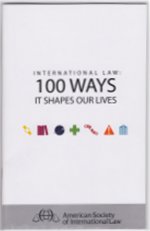100 Ways
International Law: One Hundred Ways It Shapes Our Lives

(In celebration of the 100th anniversary of the founding of the American Society of International Law in 2006, the Society published a small pamphlet titled International Law: One Hundred Ways It Shapes Our Lives. The Introduction gives an explanation for its conception: an affirmation that “international law not only exists, but also penetrates much more deeply and broadly into everyday life than the people it affects may generally appreciate.” This column seeks to elucidate and elaborate on many of the 100 ways briefly presented in the ASIL pamphlet.)
By: James G. Apple, Editor-in-Chief, International Judicial Monitor, and President, International Judicial Academy.
BEING ABLE TO TRAVEL INTERNATIONALLY WITH RELATIVE EASE, SIMPLY BY HAVING A PASSPORT (#33)
Perhaps some contemporary international passengers have occasionally wondered, while waiting in line at an immigration station at an airport or ship terminal, how the passport system originated, how it functions on a worldwide basis, and how it is administered. International law provides the answer. In 1920, the League of Nations (of which the United States was not a member) organized the Paris Conference on Passports and Custom and Through Tickets to establish, for the first time a set of standards for all passports issued by league members. This was a new development because, prior to the Conference, there will were no internationally agreed passport standards. Passports were generally not required for international travel prior to World War I.
The authority to establish international standards for passports passed to the International Civil Aviation Organization (ICAO) when it was established as part of the United Nations system in 1947.
The ICAO in the modern age has created standards for machine-readable passports worldwide and standards for the new biometric passports. It is currently headquartered in Montréal, Canada. Members of the ICAO include all of the 191 members of the United Nations. The first president of the ICAO was Edward Pearson Warner of the United States.
The ICAO has many responsibilities in addition to regulation of passport matters. These include:
- Adoption of standards and recommended practices concerning air navigation including flight inspections, prevention of unlawful interference with flights, and border crossing procedures
- Adoption of standards for aeronautical message handling
- Adoption of an international standard atmosphere used in calibrating instruments and aircraft design
- Adoption of airport and airline code systems
- Investigation of air disasters
The ICAO also encourages member countries to pursue limitation or reduction of harmful emissions from aircraft engines as a contribution to worldwide concern over global warming and climate change

 International
Judicial Monitor
International
Judicial Monitor